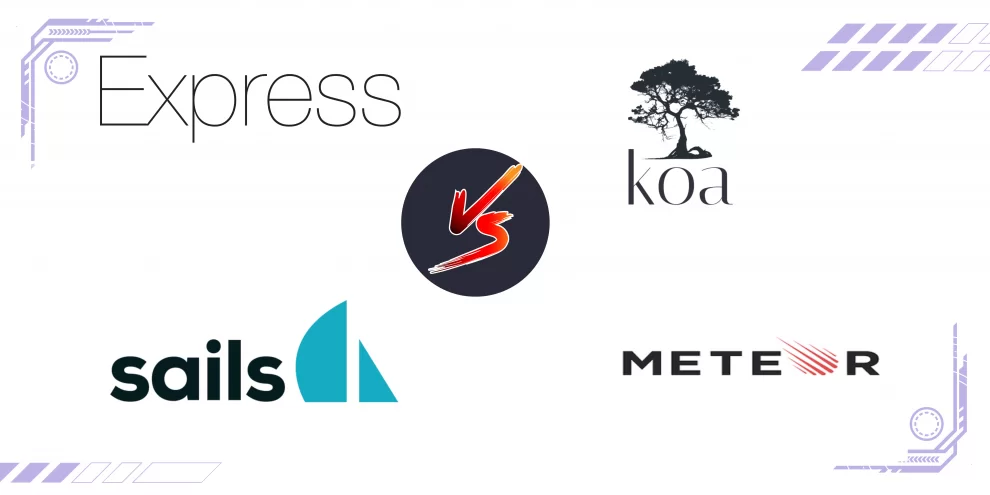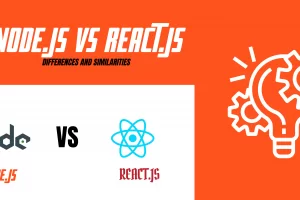In the realm of web development, making an informed choice about the right tools is crucial. Node.js Frameworks Comparison is pivotal in this decision-making process. Within the domain of Node.js web application frameworks, several options stand out, each designed with specific features and advantages. Express.js, Koa, Meteor, and Sails.js are among the prominent players, each tailored to streamline and expedite the web development process. This article offers a comparative exploration of these frameworks, shedding light on their unique features, advantages, disadvantages, notable users, and optimal use cases. Through this Node.js Frameworks Comparison, developers can gain valuable insights to guide their selection and align their choices with project goals and requirements.
Express.js: A Comprehensive Overview
Features
In the landscape of Node.js Frameworks Comparison, Express.js, often referred to as Express, is a minimal and flexible Node.js web application framework that provides a robust set of features for web and mobile applications. Here are some of its key features:
Routing:
Express allows for easy and quick definition of application routes, making it simple to respond to various HTTP methods at specific URL paths.Middleware:
It offers a middleware system that enables developers to customize the request-response cycle by adding new functionality to the application.Template Engines:
Express supports various template engines like EJS, Pug, and Handlebars, facilitating the creation of dynamic views for the application.Error Handling:
Express provides a straightforward way to handle errors during request-response cycles, enhancing application stability.Simplified HTTP Server:
With Express, creating a basic HTTP server is a breeze, allowing developers to focus on building the application’s functionality.
Advantages
Express.js has gained immense popularity among developers due to its numerous advantages:
Minimalistic and Flexible:
Express follows a minimalistic approach, providing only essential features. This flexibility allows developers to design and structure the application according to their specific needs.Rapid Development:
The simplicity and extensive community support of Express accelerate the development process, enabling quick prototyping and iteration.Robust Middleware:
The middleware system in Express is powerful, permitting the integration of various functionalities seamlessly, such as authentication, logging, and error handling.Strong Community and Ecosystem:
Express enjoys a vast and active community, resulting in a rich ecosystem of middleware, extensions, and resources, making it easy to find solutions and best practices.Performance:
Express is known for its excellent performance, making it a top choice for building high-performance web applications.
Disadvantages
While Express.js offers many advantages, it’s essential to consider its limitations as well:
Lack of Structure:
Being minimalistic, Express does not enforce a specific project structure. For larger applications, this can lead to challenges in organizing code and maintaining consistency.Learning Curve for Beginners:
Developers new to Node.js may find the learning curve steep, especially if they’re not familiar with concepts like middleware and asynchronous programming.Over-Reliance on Middleware:
While middleware is a strength, an excessive number of middleware can complicate the application’s flow and debugging process.
Companies that Use
Several prominent companies leverage Express.js for their applications:
Uber:
Uber, a globally recognized ride-sharing company, employs Express.js to power parts of their backend infrastructure.Accenture:
Accenture, a multinational professional services company, utilizes Express.js in various web and mobile applications to ensure optimal performance and flexibility.Walmart:
Walmart, one of the world’s largest retail corporations, incorporates Express.js in certain components of their e-commerce platform.
When to Choose Express.js
Consider using Express.js under the following circumstances:
Need for a Quick and Lightweight Solution:
When you require a fast and lightweight framework to build a web application with minimalistic features.Customization and Flexibility:
If you prefer a framework that offers extensive customization options, allowing you to tailor the application to your specific requirements.Building APIs and Microservices:
Express.js is ideal for creating APIs and microservices due to its routing and middleware capabilities, enabling efficient development and maintenance.Prior Experience and Community Support:
If you or your team are familiar with Node.js and are looking for a framework with strong community support, Express.js is an excellent choice.
Express.js is a powerful Node.js framework that balances simplicity with flexibility, making it a top choice for developers aiming for efficiency and rapid development while maintaining a high level of performance.
Also Read: How to Become a Backend Developer: Skills Required, Roadmap
Koa: Unlocking Elegant Web Development with Node.js
Features
In the landscape of Node.js Frameworks Comparison, Koa is a powerful and expressive Node.js web application framework that stands out for its modern design and rich set of features:
Asynchronous Flow Control:
Koa utilizes modern JavaScript features, such as async functions and generators, to streamline asynchronous flow control, resulting in cleaner and more readable code.Lightweight:
Koa is lightweight, providing the essentials for web development without unnecessary bloat, allowing developers to add only the functionalities they need.Modular Design:
Koa’s modular design allows developers to choose and use plugins (middleware) that suit their specific requirements, promoting a more tailored and efficient development process.Context-based Middleware Execution:
Koa employs a context-based approach to middleware execution, providing a more intuitive and flexible way to manage requests and responses throughout the application.Error Handling:
Koa simplifies error handling with its try/catch mechanism, enhancing code maintainability and reducing the need for complex error middleware.
Advantages
Koa.js offers several advantages that make it a compelling choice for web developers:
Simplicity and Readability:
With its use of async functions and a minimalistic design, Koa allows developers to write more readable and maintainable code.Flexibility and Customization:
Developers have the flexibility to add and use middleware as needed, tailoring the application precisely to their requirements.Improved Error Handling:
Koa’s use of try/catch greatly simplifies error handling, resulting in a more straightforward and effective approach to managing errors within the application.Efficient Asynchronous Handling:
Koa’s use of async functions streamlines the handling of asynchronous operations, promoting cleaner and more efficient code.Strong Community:
Koa benefits from a strong community that contributes to its ecosystem, providing a variety of middleware and resources for developers to leverage.
Disadvantages
Despite its advantages, Koa does have some limitations:
Learning Curve for Beginners:
Developers unfamiliar with async functions and generators may find Koa’s learning curve steep, especially if they’re new to asynchronous JavaScript.Less Abundant Middleware:
Compared to more mature frameworks like Express, Koa has a smaller ecosystem of middleware, requiring developers to potentially create custom solutions.Potentially Breaking Changes:
As Koa is evolving, major updates may introduce breaking changes, necessitating adjustments in the codebase during upgrades.
Companies that Use Koa.js
Several reputable companies have chosen Koa.js for their web development needs:
Alibaba:
Alibaba, a global e-commerce and retail company, utilizes Koa.js in certain parts of their backend infrastructure to handle web requests efficiently.Trello:
Trello, a popular project management tool, incorporates Koa.js to power aspects of their application, benefiting from its modern design and flexibility.Zillow:
Zillow, a leading online real estate marketplace, uses Koa.js to enhance the performance and responsiveness of certain components of their platform.
When to Choose Koa.js
Consider opting for Koa.js under the following circumstances:
Focus on Modern JavaScript Features:
If you want to leverage the latest JavaScript features like async functions and generators for asynchronous flow control.Customized Middleware Integration:
When you need fine-grained control over middleware and desire a more modular and customized approach to integrating functionality into your application.Handling Asynchronous Operations Efficiently:
If your application heavily relies on asynchronous operations and you aim to handle them in an efficient and readable manner.Readability and Maintainability:
If you prioritize writing clean, readable, and maintainable code, Koa.js, with its modern syntax and error-handling mechanisms, is a great choice.
In conclusion, Koa.js is a forward-thinking Node.js framework that emphasizes modern JavaScript features, flexibility, and a minimalist approach. It empowers developers to create efficient and elegant web applications, making it an attractive option for those seeking a modern and adaptable framework.
Meteor: Simplifying Full-Stack Development with Node.js
Features
In the landscape of Node.js Frameworks Comparison, Meteor stands out as a comprehensive and full-stack Node.js web application framework, offering an array of features that streamline the development process:
Full-Stack Development:
Meteor allows developers to build both the frontend and backend of an application using JavaScript, providing a seamless and consistent development experience.Real-time Data Updates:
Meteor offers real-time data updates, enabling automatic and instant updates to the UI whenever there are changes to the data on the server.Isomorphic Code:
Developers can write isomorphic code, meaning the same codebase can be used on both the client and server, saving time and effort in managing separate codebases.Data on the Wire:
Meteor sends data over the wire, not HTML, allowing for a more efficient and responsive application.Integrated Build System:
Meteor includes a built-in build system that handles package management, allowing for easy integration of third-party packages and libraries.
Advantages
Meteor.js offers several compelling advantages for developers:
Rapid Prototyping:
Meteor’s simplicity and integration capabilities enable developers to quickly prototype and iterate on ideas, accelerating the development process.Reactivity and Real-Time Updates:
Meteor’s reactivity and real-time data updates are ideal for applications that require instant updates to maintain an up-to-date user experience.Isomorphic Codebase:
The ability to use the same codebase on both the client and server simplifies development, reduces complexity, and enhances maintainability.Efficient Development Workflow:
Meteor’s integrated build system, package management, and data on the wire approach enhance the efficiency of the development workflow.Strong Community and Ecosystem:
Meteor benefits from a robust community and a wide range of packages and resources, further enhancing productivity and aiding in problem-solving.
Disadvantages
However, Meteor does have some limitations:
Learning Curve for Beginners:
Developers new to Meteor may face a learning curve, especially when understanding the intricacies of its reactive programming model and build system.Limited Control:
The integrated approach of Meteor might limit fine-grained control over certain aspects, potentially being a drawback for projects with very specific requirements.Scalability Challenges:
Meteor’s reactivity features, while beneficial, can pose challenges in scaling the application for a large number of users or handling high traffic.
Companies that Use Meteor.js
Several notable companies use Meteor.js to power their applications:
Toyota:
Toyota, a leading global automobile manufacturer, employs Meteor.js in some of its applications to enhance user experience and real-time updates.Honeywell:
Honeywell, a multinational conglomerate, uses Meteor.js for certain components of their applications, taking advantage of its rapid development capabilities.eToro:
eToro, a social trading and multi-asset brokerage company, has utilized Meteor.js in the development of parts of their platform to achieve real-time updates and interactivity.
When to Choose Meteor.js
Consider opting for Meteor.js in the following scenarios:
Rapid Prototyping and MVPs:
When speed of development is crucial, and you need to quickly build and iterate on Minimum Viable Products (MVPs) or prototypes.Real-Time Applications:
For applications requiring real-time updates and interactivity, such as social platforms, collaborative tools, or gaming applications.Isomorphic Codebase:
When you want to maintain a single codebase for both the client and server, simplifying development and maintenance.Startups and Small Teams:
Ideal for startups or small development teams looking for an efficient, all-in-one solution that supports full-stack development.
In summary, Meteor.js is a powerful and efficient full-stack Node.js framework, particularly suited for projects that demand real-time updates and rapid development. Its isomorphic codebase and reactivity features make it an attractive choice for modern web application development.
Also Read: Top Backend Project Ideas for Your Portfolio (guide for US developers)
Sails.js: Building Robust Data-Driven Applications with Node.js
Features
In the landscape of Node.js frameworks, Sails.js, a Model-View-Controller (MVC) framework for Node.js, stands out by offering a rich set of features that simplify the development of data-driven applications in this Node.js Frameworks Comparison:
MVC Architecture:
Sails.js employs the widely recognized Model-View-Controller (MVC) architecture, providing a structured way to organize the application’s components.Real-Time WebSockets:
Sails.js integrates WebSocket support, enabling real-time updates and interactions, making it suitable for applications requiring live data.Blueprint API:
Sails.js includes a blueprint API that automatically generates HTTP routes for CRUD (Create, Read, Update, Delete) operations based on the defined models, saving development time.Waterline ORM:
Sails.js utilizes Waterline, an object-relational mapping (ORM) module, allowing developers to use a consistent API to interact with various databases.Adaptive RESTful API:
Sails.js automatically generates a RESTful API for the defined models, simplifying API development and integration with frontend frameworks.
Advantages
Sails.js offers several advantages for developers and projects:
Rapid Development:
With its blueprint API and built-in features, Sails.js enables rapid development, making it suitable for projects with tight deadlines or a need for quick prototyping.Scalability:
Sails.js is scalable, making it suitable for building applications that may experience a high volume of traffic and require efficient handling of concurrent users.Flexibility and Extensibility:
While providing structure through the MVC architecture, Sails.js allows developers to customize and extend the application as needed, providing flexibility.Real-Time Functionality:
Sails.js excels in real-time functionality, making it ideal for applications where live updates and interactions are crucial.Strong Community Support:
Sails.js benefits from an active community, contributing to the availability of plugins, modules, and community-driven resources.
Disadvantages
However, Sails.js does come with some limitations:
Learning Curve:
Developers new to MVC architecture may find the learning curve steep initially, especially if they are not familiar with the principles and practices of MVC.Performance Overheads:
The abstraction provided by the ORM and other built-in features may introduce performance overheads compared to more low-level frameworks.Complexity for Simple Projects:
For simple projects, Sails.js may introduce unnecessary complexity due to its feature-rich nature, making it less suitable for straightforward applications.
Companies that Use
Several notable companies use Sails.js in their projects:
Balderdash:
Balderdash, the company behind Sails.js, uses the framework in various applications, showcasing its efficacy and reliability.Wakanda:
Wakanda, a platform for full-stack JavaScript applications, leverages Sails.js for its backend architecture, benefiting from its features and scalability.Red Hat:
Red Hat, a multinational software company, has utilized Sails.js in specific projects to streamline development and achieve real-time functionality.
When to Choose Sails.js
Consider choosing Sails.js in the following scenarios:
Data-Intensive Applications:
When developing data-driven applications that require efficient handling and manipulation of data.Real-Time Applications:
For projects that necessitate real-time updates and interactions, such as collaboration platforms, gaming applications, or monitoring tools.API-First Development:
When planning to develop an API-first application, as Sails.js simplifies API development with its blueprint API and RESTful support.Need for MVC Structure:
When a structured MVC architecture is preferred for better organization, especially in larger projects with multiple developers.
Within the context of Node.js Frameworks Comparison, Express.js, with its focus on minimalism, adaptability, and user-friendliness, equips developers with a potent framework to construct efficient and scalable web and mobile applications. On the other hand, Sails.js asserts itself as a potent framework, specifically suited for developing data-centric and real-time applications, while placing a strong emphasis on structured development through the MVC architecture.
Conclusion
In the landscape of Node.js frameworks, Express.js, Koa, Meteor, and Sails.js offer distinct advantages catering to various development needs. Express.js, with its minimalistic design and wide range of features, stands as a popular choice, providing flexibility and speed for creating scalable applications. On the other hand, Koa introduces a modern, streamlined approach to middleware handling, enhancing code readability and maintainability with its asynchronous flow control. Meteor, with its emphasis on real-time data updates and full-stack development, excels in rapid prototyping and isomorphic code usage. Lastly, Sails.js, embracing the Model-View-Controller (MVC) architecture, is ideal for data-driven applications, offering simplicity and real-time functionality through its integrated features like WebSocket support.
In conclusion, when it comes to Node.js Frameworks Comparison, understanding the strengths and optimal use cases of each framework is pivotal. Express.js is a great fit when looking for a lightweight, flexible framework that facilitates quick development, especially for APIs or microservices. Koa, on the other hand, is the choice for those valuing modern, clean code, and a more controlled middleware integration approach. Meteor suits projects that demand real-time updates and rapid prototyping, making it a preferred option for startups. Sails.js shines in scenarios where structured development and efficient handling of data are crucial, making it apt for data-intensive applications and projects that prioritize MVC architecture. Each framework caters to specific project requirements, and understanding their strengths allows developers to make informed choices tailored to their needs.















